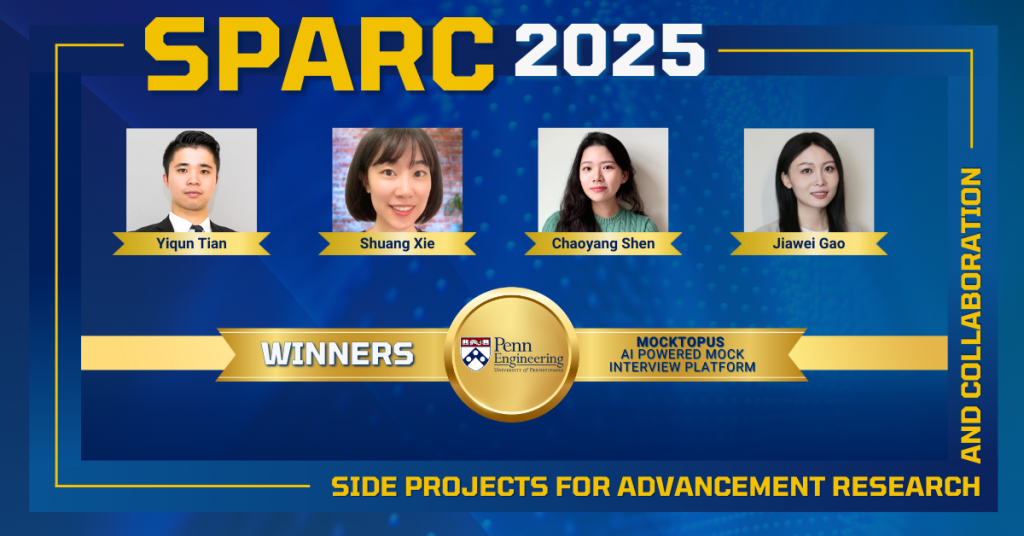A Showcase of Innovation at SPARC 2025

Each summer, Penn Engineering Online students have the opportunity to take part in a 12-week competition called Side Projects for Advancement, Research, and Collaboration (SPARC). This annual competition enables students in the online Master of Computer and Information Technology degree program to expand their technical capabilities and utilize their programming skills outside of class while applying creativity and teamwork. Students form small teams, work with alumni mentors, and develop unique side projects that can serve as tangible assets in their job search.
As students prepare to pursue new career opportunities, it is essential that they demonstrate not only their technical expertise but also the transferable skills gained through academic and professional experiences. Side projects provide a valuable means for employers to evaluate both hard technical competencies and critical soft skills such as time management, effective communication, collaboration, and creativity.
In 2025, nine teams participated in the competition, tackling issues ranging from career preparation and personal productivity to pet care and sustainable transportation. The students selected a project of interest and combined collaboration, innovation, and perseverance to deliver polished technical solutions. Their work over the course of the competition reflects both the depth of their education and their ability to apply their skills and knowledge to create real solutions.
From Side Projects to Stand Out Resumes
Across the nine projects, teams worked with a wide range of programming languages and frameworks, including Python, JavaScript, TypeScript, Swift, and React/React Native, as well as backend tools such as Node.js, Express, and FastAPI. Many teams implemented cloud and database technologies like MongoDB, PostgreSQL, AWS, and Firebase, while others experimented with cutting-edge AI models for tasks such as natural language processing, image captioning, and time-series forecasting. These diverse technical approaches underscore the practical, hands-on skills that Penn Engineering Online courses teach — skills that will also be extremely valuable outside of the classroom, as students apply their course knowledge in technical careers.
The best projects encompass the following:
- Students are able to highlight the purpose of the project, technical interventions, building process, and intended results.
- Students will balance practicing existing skills and building new skills in the process of developing this project.
- Teams will exemplify good communication and collaboration throughout the duration of the project.
Each member of the winning team will receive a cash prize to use towards a professional development opportunity, such as conference registration fees or career resource subscriptions.
Beyond the immediate outcomes of the competition, SPARC serves as a powerful career development experience. Students walk away with polished projects they can showcase in their portfolios and on their resumes. Many participants leverage their SPARC experience in interviews, drawing on it as a narrative that highlights both their hard and soft skills: communication, time management, leadership, and collaborative development under deadlines.
Meet the 2025 SPARC Teams
Winning Team
Mocktopus: AI-Powered Mock Interview Platform

Members: Chaoyang Shen, Jiawei Gao, Yiqun Tian, Shuang Xie
Mentor: Valerie Mac Comish Ripa (MCIT Online ’23 Alum)
The Mocktopus team set out to tackle one of the most common hurdles faced by job seekers: effectively preparing for interviews. Their project, Mocktopus, is an AI-powered platform that provides on-demand mock interview practice, personalized feedback, and progress tracking to show growth over time. By combining natural language processing with real-time transcription, the team created a tool designed to help candidates gain confidence and improve their performance in both technical and behavioral interviews.
After careful consideration, the panel of judges for this year’s competition has selected Moctopus – AI-Powered Mock Interview Platform as the winning project. This innovative web application will be an incredibly beneficial tool to anyone looking to improve their interview skills.
“We’re all interviewees at some point—especially in today’s fast-evolving, AI-driven world,” commented Moctopus team member Jiawei Gao. “Inspired by the intelligent and adaptive octopus, Mocktopus aims to support learners with flexibility and smart assistance—just like an octopus with its many capable arms.”
Reflecting on the experience, Chaoyang Shen explained, “SPARC offered a unique opportunity to dive deeper into a topic I care about while working closely with a mentor and a supportive team.” Team member Yiqun Tian shared, “I’m most excited to see our AI interview platform come together into a well-designed, working product that can be accessible to anyone.”
PlugPorch

Members: John Suli, Jia Wu, Thien Tong, Vincent Luu
Mentor: Andrii Podhornyi (MCIT Online ’24 Alum)
As electric vehicles become more common, reliable access to charging stations remains a challenge. That’s why PlugPorch, a mobile app that connects EV owners with individuals who are willing to rent out their home charging stations, aims to make charging more accessible and convenient. Much like the Airbnb model, the app transforms private chargers into shared, rentable assets. Users can browse nearby charging options, book time slots, and even communicate directly with hosts through in-app messaging.
Team member Jia Wu highlighted the value of the SPARC experience, noting, “I wanted to gain experience building a mobile app from scratch and thought SPARC would be a great opportunity to do this with other students in the program.”
“I learned how to work with mobile frameworks such as React Native, Expo, and I improved my time management and communication skills. I’ve also gained experience in structuring a project from scratch,” shared John Suli.
HARP (High-Level Adaptive Reservoir Programming)

Members: Helen He, Axel Delakowski, Raymond Setiawan, Pranav Thokachichu
Mentor: Connor Hause (MCIT Online ’23 and MSE-DS Online ’25 Alum)
Time-series forecasting is a powerful tool across industries, but most platforms require advanced programming expertise. The HARP team built a lightweight, web-based forecasting platform that allows users to upload datasets and design machine learning models through a visual interface—no coding required. By leveraging Echo State Networks, HARP delivers quick, efficient predictions and makes advanced forecasting accessible to a broader audience.
Team member Helen He outlined several benefits of participating in SPARC, “I see this opportunity as a way to apply the concepts I’ve learned in the MCIT program in a practical setting, collaborate with peers, and enhance my resume with meaningful, project-based experience that aligns with my career goals.
“I learned to use best practices to develop our websites and applications, adhering to ISO standards (security standards, defensive programming, etc),” commented Raymond Setiawan.
Pranav Thokachichu discussed how SPARC participation has improved his skills, “Through this process, I’ve seen how many of the principles we’ve learned in class can be combined to create a functional, meaningful product. I believe this experience will make my continued learning in computer science even more rewarding and will strengthen my ability to apply technical skills in practical, impactful ways.”
Reflecting on the valuable mentor guidance their team received, Axel Delakowski shared, “Our mentor was able to validate our assumptions on what tech stacks to use and got us kick-started on what the framework should look like. He gave us the confidence to continue with the project.”
PicSeek

Members: Renjun Ma, Dongnian Zhou, Wenhui Kong, Vivian Fan
Mentor: Steve Wang (MCIT Online ’21 Alum)
The PicSeek team focused on improving how people search and organize personal photo libraries. Their iOS app automatically generates captions for photos using AI, making them searchable by keywords and phrases. Users can edit captions, group photos into folders, and even integrate social sharing features. The app aims to reduce the frustration of sifting through large photo collections while providing a more intuitive and expressive way to preserve memories.
Renjun Ma shared their motivation for joining SPARC, “I’m focused on building a strong foundation for future internships and career opportunities. SPARC gives me a chance to work on a meaningful project, gain hands-on experience in mobile and AI-driven development, and strengthen my resume with practical, portfolio-ready work that reflects both my interests and my growth as a developer.”
“In terms of collaboration, we used a lot of screen recording clips to show each other progress. I feel that is very helpful and necessary. GitHub version controls are critical, but visual progress during app development provides another layer of insight,” commented Dongnian Zhou.
Reflecting on the skills developed through this project, Wenhui Kong noted, “Throughout the project, I developed a deeper understanding of iOS data structures and gained experience working with data structures like UserDefaults and Core Data. This experience also helped me become more user-focused, learning to view problems from the end user’s perspective.”
Resumix

Members: Xuanhe Zhang, Laura Chen, Xiao Dong
Mentor: Wenhao Guo (MCIT Online ’20 Alum)
Recognizing how daunting the job market can be for new graduates, the Resumix team created a tool to help applicants strengthen their resumes with AI-driven insights. The platform evaluates a resume against a job description, highlights areas for improvement, and suggests targeted revisions. By providing side-by-side comparisons of original and revised sections, Resumix empowers users to iteratively refine their applications and stand out in competitive hiring environments.
Team member Xuanhe Zhang shared, “Throughout the development process, we did a lot of brainstorming to improve user experience and add more features, which has been really helpful for my own growth in building applications.” Discussing what they gained from the process, team member Laura Chen explained, “As we approach the final weeks, it’s incredibly rewarding to look back on the challenges we’ve overcome and the creative solutions we’ve developed. There’s a strong sense of accomplishment and growth, both individually and as a team.”
PawPawMate

Members: Yuqing Wu, Xiye Mou, Jinhui He
Mentor: Thomas Lee (MCIT Online ’23 Alum)
With more than 86 million U.S. households owning pets, the Barchitects team recognized a gap in how pet owners connect and share information. In response, they built PawPawMate, a full-stack web platform that integrates interactive maps, real-time lost-pet alerts, and community-driven reviews. Gamified features, including AI-generated reward cards, help foster engagement and trust among users. The project’s goal is to create a dedicated space for pet owners to support one another beyond generic platforms like Yelp or Google Maps.
Explaining the inspiration behind their idea, Yuqing Wu shared, “All of us are pet owners who deeply enjoy the companionship of our animals. We wanted to create something that truly supports pet-living communities like ours.” During the last few weeks of the competition, Jinhui He showed enthusiasm for the finished project. “I’m most excited to see our project actually come together and be ready to deploy.”
RocketOffer: Your AI-powered Career Navigator

Members: Xujia Zhang, Yue Zhong, Yuxuan Zhou, Jun Wang
Mentor: Yaya Liang (MCIT Online ’20 Alum)
The RocketOffer team set out to reimagine the job search process, which can often feel overwhelming and fragmented. Their platform consolidates every step of the journey—from tracking applications to tailoring resumes and preparing for interviews—into a single AI-powered command center. With features like an AI resume editor, a personalized career planner, and a mock interview simulator, RocketOffer empowers users to navigate the job hunt more efficiently and confidently.
Reflecting on the value of the program, team member Xujia Zhang said, “I have greatly improved my collaboration and time management skills. Working with a team to meet weekly milestones has taught me how to communicate more effectively and manage a project from start to finish.” Jun Wang also shared key takeaways from the project: “I learned a lot about the market landscape in AI and recruiting, and I also worked on and improved my team communication skills.”
Cyclone: AI-Powered Cycling Routes

Members: Owen Kobasz, Matt Schwartz, Mandy Shek, Le Zhang
Mentor: Nikolas Nazario (MCIT Online ‘23 Alum, MSE-DS Online Student)
As cycling has surged in popularity in recent years, the Cyclone team recognized a gap in accessible, intelligent route planning. Their solution, Cyclone, is an AI-powered web application that generates personalized cycling routes. By combining routing engines like Valhalla and OpenStreetMap with GPT-driven inputs, the platform enables cyclists to create routes tailored to distance, elevation, and personal preferences—all exportable to GPS devices. With its seamless design and responsive interface, Cyclone aims to help riders spend less time planning and more time on the road.
Reflecting on the project’s development, team member Le Zhang noted, “I wanted to gain experience in full-stack software development. I have learned coding skills in Node.js, React, and Tailwind, and also enhanced my ability to collaborate with others and work out plans.” Sharing the hurdles their team faced, Matt Schwartz commented, “I think the biggest challenge was really learning how to plan out this program. We had to meet several times (and continuously) to really iron out our plan.”
FlowMinder

Members: Dom Chaloeisak, Hamudi Jesri, Evan Law, Sarah Bicky
Mentor: Eric Berkovsky (MCIT Online ‘22 Alum)
Meetings are a central part of modern work, but they often run long, lose focus, or discourage participation. The FlowMinder team set out to solve this by developing a real-time Zoom app that helps hosts and participants keep discussions structured and inclusive. The tool integrates agendas, live timers, and subtle participant nudges to manage speaking time and maintain balance. With features like real-time synchronization, participant feedback signals, and agenda tracking, FlowMinder aims to make remote collaboration more efficient and equitable.
Considering next steps after graduation, team member Evan Law explained, “Collaborating in a cross-functional group mirrors the kind of environment I expect to work in after graduation, and I saw this as an opportunity to develop both my technical and interpersonal skills.”
Hamudi Jesri had similar thoughts on how participation in SPARC will affect their opportunities moving forward. “The tools and languages we used in this project align with some of the job offers I’ve already seen. Looking back, it also gives me a very solid pool of topics to derive from during interviews, both for behavioral questions as well as technical ones.”
Team member Sarah Bicky discussed new skills she learned through SPARC. “I gained a deeper understanding of how the front end and back end of a program interact, as well as how to design with user experience and user interface principles in mind.” Heading into the last few weeks of the competition, Dom Chaloeisak shared the team’s anticipation for the finished product. “I’m excited to put all of the different pieces of the project together and see the application finally working. I also want to see if we can actually implement the “nice to have” features if time permits.”
Competition Takeaways
The 2025 SPARC competition highlights not only the technical skills of Penn Engineering Online students but also their ability to collaborate, adapt, and think creatively about solving real-world problems. With guidance from dedicated mentors and support from their peers, each team transformed an idea into a functioning product over the course of the summer. SPARC is a valuable professional development opportunity that many students have leveraged to secure employment at top organizations.
From AI-powered interview preparation to community platforms for pet owners and cyclists, the projects demonstrated the diverse ways technology can address challenges both personal and global. More importantly, SPARC underscores the spirit of innovation and community that defines Penn Engineering Online. As these students move forward in their academic and professional journeys, their SPARC experience will remain a touchstone for collaboration, resilience, and impact.
Recognition
SPARC 2025 was made possible through the efforts of many—our students, judges, mentors, and, in particular, Penn Engineering’s dedicated Career Advisor, Saryu Sanghani, who guided this year’s competition. Congratulations as well to the nine teams who completed the competition and presented their projects for evaluation by our esteemed Penn Engineering alumni judges:
Veronika Alex
MCIT ‘18 Alum

Veronika Alex is an Engineering Manager at Apple, where she leads a global software engineering team within the CoreOS organization. Specializing in the optimal compilation and delivery of low-level software components for Apple’s kernel projects, Veronika’s work is integral to the seamless delivery of CoreOS software. With a background in Economics, Physics, and Computer Science from her undergraduate studies, and a Master’s degree from the MCIT on-campus program in 2018, Veronika leads engineering teams with a multidisciplinary perspective.
Luke Glover
MCIT Online ‘20 Alum

Originally from Hong Kong, Luke has been living in the U.S. since he started college. He was enrolled in medical school after graduating from university, but decided to take a break from the program and explore computer science through the MCIT Online program. After graduating with an MCIT degree, Luke committed to his career pivot and has been working as a software engineer for over four years. He is currently a Software Engineer at Google.
Peter Brice
MCIT Online ‘23 Alum

Peter Brice is an Application Developer at Vanguard with two years of experience specializing in performance testing, service virtualization, cloud-native, AWS development of JavaScript, Python, and Java-based applications. Before transitioning into software engineering, he completed his MCIT degree online while working for a decade in geoscience IT for a global mining and oil & gas company across four continents. His favorite memories of the MCIT program include TA-ing Data Structures and Software Design, meeting Boon Thau Loo at an MCIT meet-up in Singapore, and coding a Sudoku solver in CCB’s AI class.
Interested in SPARC?
There are a myriad of benefits for students who enroll in the SPARC competition, including a chance to:
- Create within a collaborative, real-world project setting that provides more in-depth experience than a traditional classroom project can
- Bolster current technical skills through hands-on practice and gain new capabilities through exposure to novel tools and skills
- Acquire a new asset to include on a resume to showcase abilities to potential employers
- Cultivate transferable skills that can increase hireability, such as time management, interpersonal communication, adaptability, project management, problem-solving, etc.
You can learn more about the SPARC Program and additional professional development resources provided to online graduate students by visiting our Career Services page.
